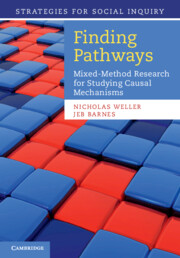Book contents
- Frontmatter
- Contents
- List of figures
- List of tables
- Acknowledgments
- 1 Pathway analysis and the elusive search for causal mechanisms
- 2 Preparing for pathway analysis
- 3 Case selection for pathway analysis
- 4 Comparison of case selection approaches
- 5 Regression-based case selection for pathway analysis of non-linear relationships
- 6 Matching to select cases for pathway analysis
- 7 Using large-N methods to gain perspective on prior case studies
- 8 Pathway analysis and future studies of mechanisms
- 9 Conclusion
- Glossary of terms
- References
- Index
1 - Pathway analysis and the elusive search for causal mechanisms
Published online by Cambridge University Press: 05 July 2014
- Frontmatter
- Contents
- List of figures
- List of tables
- Acknowledgments
- 1 Pathway analysis and the elusive search for causal mechanisms
- 2 Preparing for pathway analysis
- 3 Case selection for pathway analysis
- 4 Comparison of case selection approaches
- 5 Regression-based case selection for pathway analysis of non-linear relationships
- 6 Matching to select cases for pathway analysis
- 7 Using large-N methods to gain perspective on prior case studies
- 8 Pathway analysis and future studies of mechanisms
- 9 Conclusion
- Glossary of terms
- References
- Index
Summary
The allure of mixed-method research in the search for causal mechanisms
Scholars of judicial behavior have found time and time again an association between US Supreme Court justices’ political ideologies and their votes (e.g., Pritchett 1948; Rhode and Spaeth 1976; Schubert 1965; Segal and Cover 1989; Segal et al. 1995; Segal and Spaeth 1993, 1999, 2002). Scholars differ sharply, however, over the meaning of this finding. Behavioralists argue that the relationship between ideology and votes suggests that justices largely ignore the law and impose their personal preferences when deciding cases. “Simply put, Rehnquist votes the way he does because he is extremely conservative; Marshall voted the way he did because he is extremely liberal” (Segal and Spaeth 1993: 65). Postbehavioralists envisage a very different decision-making process (Gillman 2001). They argue that justices begin with a good faith understanding of legal rules and principles, and that those general legal principles meaningfully constrain justices’ discretion (e.g., Burton 1992; Gillman 1993, 1996; Cushman 1998; see also Dworkin 1978). From this perspective, conservative and liberal judges can end up voting quite differently from one another while still applying the same legal principle, just as two sergeants ordered to choose the “best” five soldiers from a platoon might both follow the order but still select different soldiers (Dworkin 1978).
- Type
- Chapter
- Information
- Finding PathwaysMixed-Method Research for Studying Causal Mechanisms, pp. 1 - 18Publisher: Cambridge University PressPrint publication year: 2014



